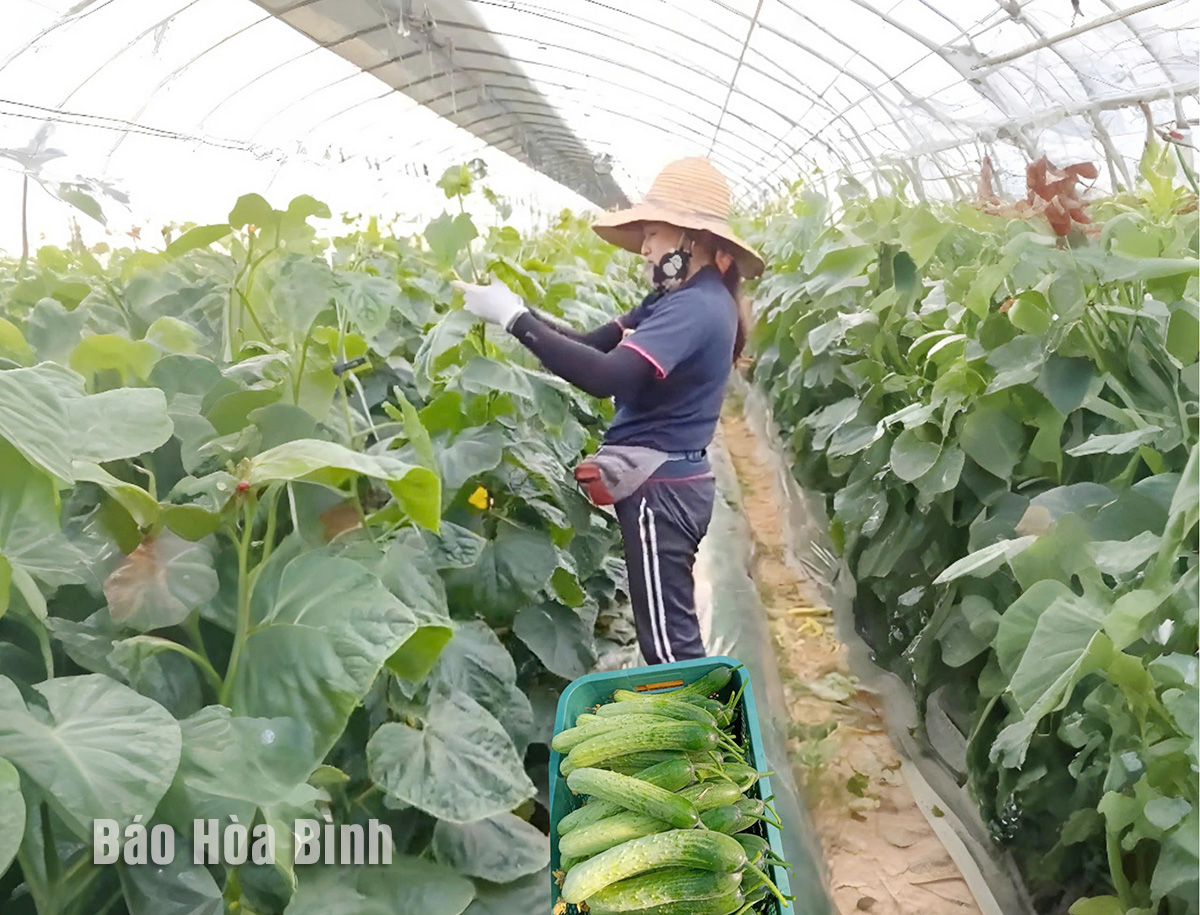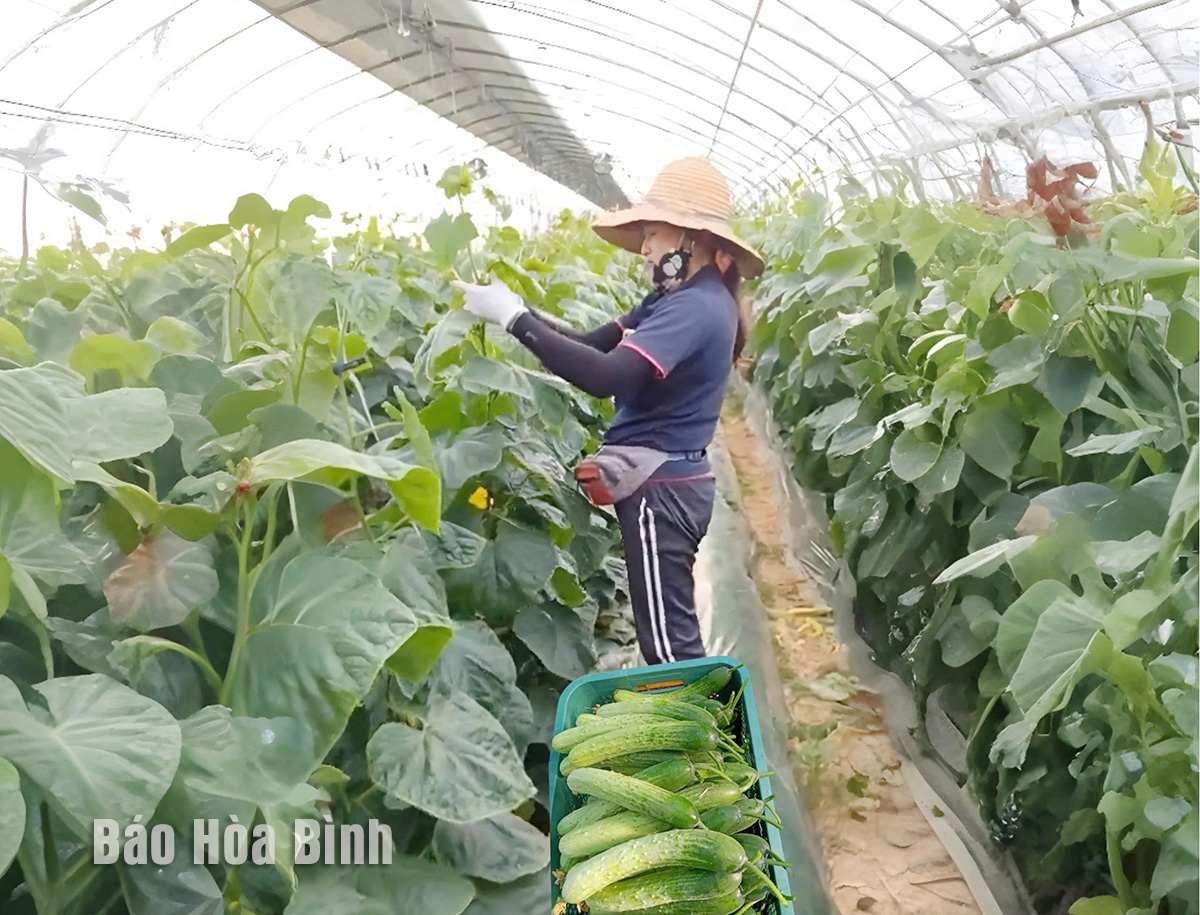
In late March, 29 labourers from Da Bac district were sent to work as seasonal farm workers in Buyeo county, Chungcheongnam province, the Republic of Korea (RoK). Upon arrival, they quickly settled into their jobs, enjoying good working conditions and benefits, with wages aligned with the terms of their signed contracts. The programme is now being expanded, with relevant departments and sectors actively seeking additional seasonal employment opportunities in various localities across the RoK.
A labourer from Da Bac district works at a farm in Buyeo county, Chungcheongnam province, the Republic of Korea.
Giving priority to the impoverished district of Da Bac, the province launched the second round of its seasonal overseas employment programme, while also carrying out preliminary health checks, as well as assessments of skills and work experience.
Luong Thi Mo, a 42-year-old resident of Kia Hamlet, Yen Hoa Commune, shared that, with only basic skills and given their current circumstances, many working-age people, especially those in middle age are eager for opportunities to change their lives and support their families. For her, seasonal overseas employment has opened up that opportunity. "I heard that the Korean side is seeking 50 workers in this second round. As one of 200 applicants, I hope to be selected,” she said.
The pilot programme to send seasonal workers to the RoK under locality-to-locality cooperation is a meaningful initiative, aimed at implementing Government Resolution No. 59/NQ-CP dated April 27, 2022. The resolution supports ongoing efforts to dispatch seasonal labourers through partnerships between Vietnamese and Korean localities. After extensive preparation, on November 4, 2024, Hoa Binh province signed a cooperation agreement to send farm workers to Buyeo county, Chungcheongnam province. The programme is non-profit and conducted by state agencies and public institutions, making it accessible and suitable for local workers.
According to Do Hong Truong, Director of the Hoa Binh provincial Employment Service Centre, the initial phase of the programme has delivered promising results. Workers have shared photos and videos showing well-organised, clean accommodations with full amenities, and a rural working environment similar to that in Vietnam. Their main tasks include cultivating and harvesting cucumbers, tomatoes, vegetables, and various fruits. All 29 workers reported satisfaction, adherence to contract terms, and a positive attitude toward their work.
Eligibility criteria for the seasonal overseas employment programme include permanent residency in Hoa Binh province, being aged between 25 and under 50, and having at least one year of experience in agricultural work. Contract durations range from five to eight months, with monthly wages equivalent to VND36–37 million (around 1,390 – 1,430 USD).
In April, the Department of Home Affairs submitted a proposal to the provincial People’s Committee, seeking the approval for signing cooperation agreements with RoK localities. To proactively identify potential candidates, district- and city-level authorities have disseminated information about the programme to communes, wards, towns, and local organisations such as youth, women and farmers’ unions. To date, more than 500 people across the province have expressed interest in participating.
Bui Manh Cuong, Deputy Director of the Department of Home Affairs, said as the global labour market continues to expand, seasonal labour dispatch to the RoK is attracting strong interest.
With its competitive wages, professional work environment, and valuable learning opportunities, the programme not only opens new venues for sustainable poverty reduction but also helps rural workers gain scientific and technological knowledge. This can later be applied to develop local production models upon their return, he said.
The emulation movement "Hoa Binh joining hands to build new-style rural areas” has been widely spreading, becoming a driving force that motivates the localities to renew rural landscapes and improve the material and spiritual lives of the residents. In this movement, the people play a central role-both as the main implementers and direct beneficiaries of its outcomes.
In response to the global digital revolution, Hoa Binh Newspaper is transforming itself into a modern and multi-platform media hub, blending cutting-edge technology with a restructured newsroom and a new generation of tech-savvy journalists.
Hoa Binh province’s Association of the Elderly recently held a conference to review the project on expanding the inter-generation self-help club model until 2025.
In a move to implement Resolution No. 57-NQ/TW, issued on December 22, 2024 by the Politburo, which targets breakthroughs in science-technology development, innovation, and digital transformation, the Hoa Binh provincial Department of Health has issued a plan to roll out the "Digital Literacy for All” campaign within the local health sector.
An Nghia Commune (Lạc Sơn District) is one of the communes that achieved the tha standard of the national new rural area in 2018. Entering a new development phase, the commune is now trying to meet the criteria for the advanced new rural development. With the strong political will and the public consensus, the commune is gradually overcoming the challenges to reach this goal, aiming for the sustainable development.



